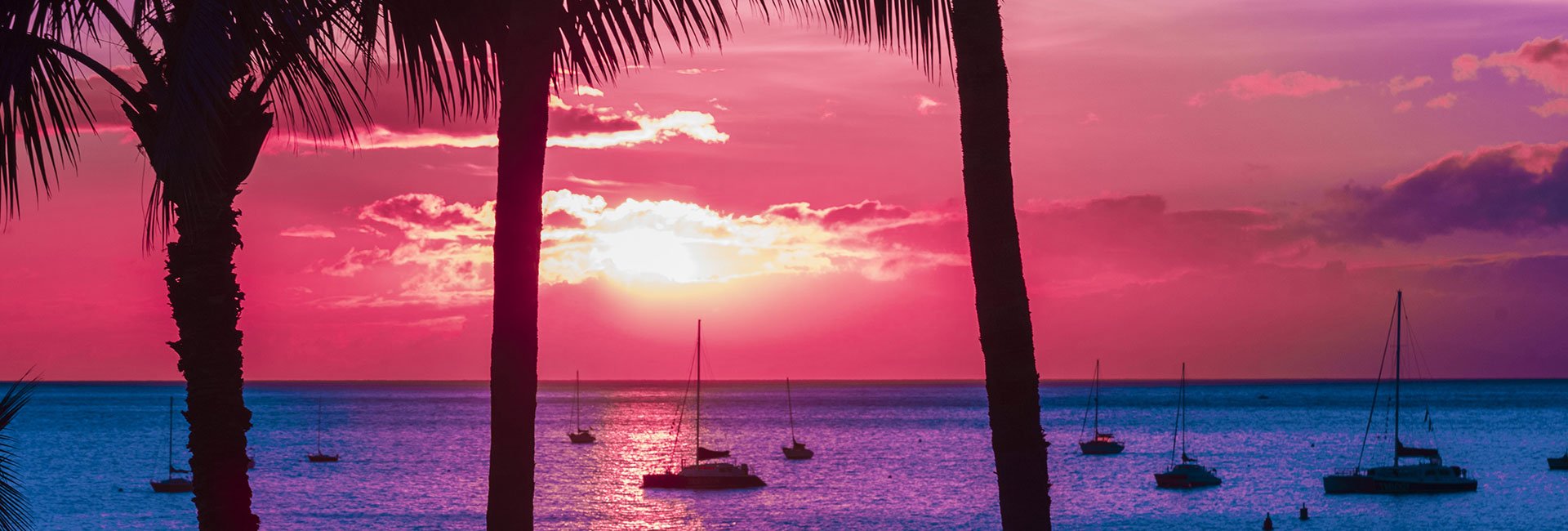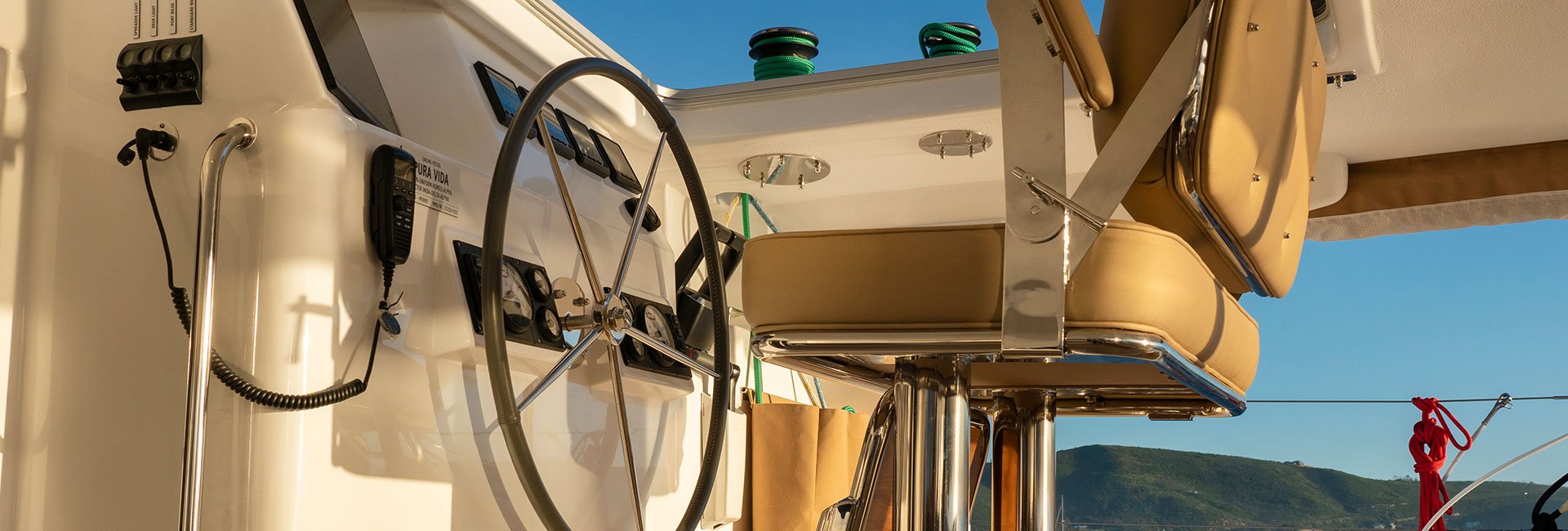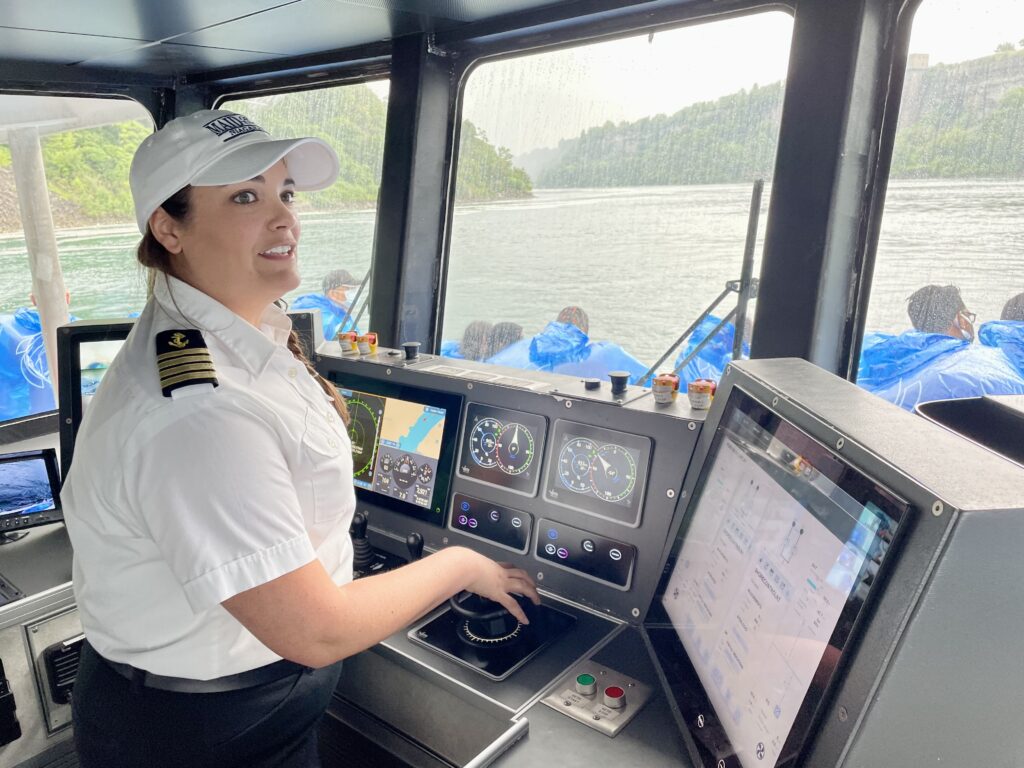

Why Obtaining Your Captain‘s License Is Essential
How to get your captain's license and pilot your own yacht.
If your boat is longer than 9 metres, without a skipper’s or captain’s license, you cannot legally take it out to sea.
That kind of defeats the purpose of owning a boat, right?
Earning a captain’s license and being able to confidently pilot your own yacht will be your passport to traversing our planet’s beautiful oceans. You will have the freedom to explore the seas to your heart’s content without a care in the world.
Getting the right certification for your requirements, be it a Day Skipper , Coastal Skipper , Local Waters Skipper or Yachtmaster Offshore Certificate of Competence , will allow you and your sailing companions to get the most out of your yacht and enjoy it to the maximum.

Become a yacht captain by acquiring your captain's license
If you already have significant sailing experience, you may want to go the self-study route and simply take your exams at an accredited sailing school.
If you are new to the world of sailing, you’ll want to choose a reputable sailing school. They should provide you with the necessary practical and theoretical training to confidently captain your yacht.
Here are the various Certificates of Competency (COCs) or 'Captains Licenses'
- Inland Waters Skipper
If you hold this license, you will be qualified to skipper a sailboat inland during day and night.
- Day Skipper
This skipper’s license will qualify you to captain a sailboat at sea in local waters from sunrise to sunset. Local waters are defined as 15 nautical miles, or 25 miles, from your home port, given that they are no more than 15 nautical miles from an approved safe haven.
- Local Waters Skipper
Holding this license, you will be qualified to skipper a sailboat at sea by day or by night in local waters, as defined for the Day Skipper’s license set out above.
- Coastal Skipper
A Coastal Skipper‘s license will qualify you to skipper a sailboat on any coastal passage, as long as it is within 40 nautical miles of the coast, day or night.
- Yachtmaster Offshore
A Yachtmaster Offshore skipper’s license will qualify you to captain a sailboat on any extended or ocean passage.
- Yachtmaster Ocean
A Yachtmaster Ocean certificate is a badge of honour, indicating that you have mastered celestial navigation.

To sail around the world, you will need a captains license!
You will need your international accreditation through the Royal Yacht Association or International Yacht Training if you wish to skipper a yacht or superyacht as a career.
International Certificate of Competence
If you plan to sail your yacht around the world, you’ll have to obtain an International Certificate of Competence (ICC) . The ICC has been likened to an international driver’s license for boats.
If you have your sights set on the waters of Europe and the Mediterranean, you will need an ICC to do so legally. However, it is essential to note that the US and Canada have different international captain license requirements and do not recognise the International Certificate of Competence.
You will have to contact a Royal Yachting Association affiliate to obtain an ICC in North America.
COCs - start your captain's license from the beginning
The various Certificates of Competence are progressive, so it makes sense to start with your Day Skipper’s license , and progress to your Yacht master Offshore captain’s license from thereon.
An important consideration to keep in mind is that the Certificate of Competence you select will very much depend on your individual needs and circumstances.
For example, the requirements for a Recreational Sailing Certificate of Competence differ from a Commercial Sailing Certificate of Competence . So, your motivation (recreational, commercial or professional international sailing) will determine which skipper training course you select.
There are also some necessary prerequisites that have to be met before any sailor can apply for skipper’s license training. They are:
- All candidates must be at least 16 years of age
- For ocean sailing, candidates need a radio operator’s certificate valid for operating a marine VHF radio in South Africa
- All candidates will have to pass a basic eye test. If you are colour blind, you will not be able to proceed past the Day Skipper Certificate of Competence
- Candidates for the Coastal Skipper Certificate of Competence and above must have a current and valid Level 1 First Aid Certificate
- All candidates will have to produce a logbook of experience to get their qualification. The required expertise to be logged varies depending on the certification course.
Here you will find lots of information on the various sailing Certificates of Competence (or skipper tickets, as they are also known) available to you.
Just keep in mind that such certificates (and what they will legally qualify you for) vary from country to country.
If you are a non-SA citizen, you will have to research your country’s legal requirements for the various sailing Certificates of Competence.

How long does it take to become a yacht captain?
This will depend on the skipper’s course you decide on. To obtain certification in basic sailing skills is quite affordable and could take as little as three weekends to complete.
Courses like the Yachtmaster Ocean Certificate of Competence are much more comprehensive, intensive and costly. This course takes about 17 weeks to complete.
Why getting your skipper’s or captain’s license will be worth every cent
Unless you have a sailing crew (including a qualified skipper) at the ready, it will be absolutely worth your while to obtain the necessary credentials to skipper your yacht yourself.
South Africa has many reputable, accredited sailing schools. They can provide you with all the information and training you need to obtain the captain’s or skipper’s license that is right for your requirements.
Undergoing the necessary practical and theoretical training will give you all the knowledge and experience to sail your boat with confidence.
What’s more, your skipper’s license training is likely to be an exhilarating adventure in itself.
It is also an excellent way to meet other sailing enthusiasts who might just become friends for life.

Yacht Maintenance - Top Tips for Protecting Your Investment
Essential things to know about boat insurance, top things to know about yacht solar power, building a yacht: top things to know about the yacht-building process, get all the latest to your inbox, discovery awaits.

- Skip to primary navigation
- Skip to main content
- Skip to footer

(866) 300-5984 [email protected]
What are the Requirements for Earning a Captain’s License ?
U.s. coast guard requirements for national oupv or master up to 100 tons.
A Captain’s License is required to operate a commercial vessel or to take paying passengers out on your vessel. Understanding the Captain’s License Requirements is important prior to taking a captain’s license course. The prerequisites should be reviewed before applying for any U.S. Coast Guard credential. This is advised so you don’t spend your time and money pursuing a license that you don’t qualify for. For Maritime Institute’s fee-based credential services, click here to get more info.

Prerequisites for Operator of Uninspected Passenger Vessels (OUPV/”6-Pack”)
The National OUPV license is limited to uninspected vessels, of less than 100 gross tons, operating on U.S. domestic waters ONLY. Also limited to carrying six or less paying passengers. You must meet all of the requirements established by the USCG National Maritime Center in order to apply for this license. The USCG checklist of requirements is located here on the National Maritime Center website: https://www.dco.uscg.mil/nmc/checklist/ . Under National Officer Endorsements for Deck, click on National OUPV Less Than 100 GRT.
Important sea service requirements for OUPV:
- Must be at least 18 years old.
- Must be able to document 360 days of experience on a vessel, of which at least 90 days must be on Near Coastal/Ocean waters otherwise license will be limited to Inland Waters ONLY. ( See: What Counts as Sea Service )
- 90 days of sea service must be within the last 3 years of when you apply.
- 90 days of sea service must be on Ocean or Near Coastal waters or otherwise the license will be limited to Inland Waters only.
- If you are not a U.S. Citizen, you can apply for this license but it will be limited tonnage and restricted to undocumented vessels.
Prerequisites for Master up to 100 Tons on Inland Waters/Great Lakes
With a Master license you may operate inspected/commercial vessels and also take more than six paying passengers. You must meet all of the requirements established by the USCG National Maritime Center in order to apply for this license. The USCG checklist of requirements is located here on the National Maritime Center website: https://www.dco.uscg.mil/nmc/checklist/ . Under National Officer Endorsements for Deck, click on National Master 100 GL and Inland.
Important sea service requirements for Master Inland/GL:
- Must be at least 19 years old.
- Must be able to document 360 days of experience on a vessel. ( See: What Counts as Sea Service )
- The tonnage of the license (25 Ton, 50 Ton, or 100 Ton) that you get, is determined by your experience. See USCG checklist in the paragraph above for the specific tonnage qualifications .
If you plan on operating an inspected sailing vessel, you must have a sailing endorsement along with the Master Inland/GL license. The required amount of sea service for a sailing endorsement on a Master Inland/GL license is: 180 days on sail or auxiliary sail vessels.
Prerequisites for Master up to 100 Tons on Near Coastal Waters
With a Master license you may operate inspected/commercial vessels and also take more than six paying passengers. You must meet all of the requirements established by the USCG National Maritime Center in order to apply for this license. The USCG checklist of requirements is located here on the National Maritime Center website: https://www.dco.uscg.mil/nmc/checklist/ . Under National Officer Endorsements for Deck, click on National Master 100NC .
- Must be able to document 720 days of experience on a vessel, of which at least 360 days must be on Near Coastal/Ocean waters. ( See: What Counts as Sea Service )
If you plan on operating an inspected sailing vessel, you must have a sailing endorsement along with the Master Near Coastal license. The required amount of sea service for a sailing endorsement on a Master NC license is: 360 days on sail or auxiliary sail vessels.
- Cookie Policy
- Privacy Policy
- Terms of Use
Sign Up For Our E-Newsletter!
Maritime Institute Online Course Portal Book Examination - San Diego, CA
Privacy Overview
Log in to maritime institute.
Which USCG Captain's License Should You Choose?
OUPV or Master License? Your choice depends on vessel size and passenger count. Learn the requirements and how to upgrade later.
The first step you need to take to get your captain’s license is to decide which type of license you’re going to pursue.
There are two main types of Coast Guard licenses:
License Type #1 - 25 ton, 50 ton, or 100 ton Master License
License Type #2 - Operator of Uninspected Passenger Vessels (OUPV or Six Pack)
The type of license you choose depends on the size and type of vessel and the number of passengers aboard. You can always upgrade your captain’s license and add endorsements along the way.

OUPV/Six-Pack
The OUPV/Six-Pack license is the USCG license that many recreational boaters choose. It’s called the six-pack license because it allows you to take up to six paying passengers and crew members. This allows you to do small fishing trips, sightseeing tours, dive boats, or sail boats.
The OUPV license is also limited to vessels that are 100 gross tons (about 80 feet long).
Many boaters will get their OUPV license even if they have no intention of doing commercial boating. You don’t need to be licensed by the Coast Guard to use your personal boat, unless you’re taking paying customers out on the water.
Getting your license is still valuable because you’ll brush up on your navigation and safety skills. Plus, having your license gives you the option to captain in a commercial setting.
The OUPV qualifies you to captain uninspected vessels. USCG uninspected vessels can carry up to six passengers and aren’t required to be inspected by the Coast Guard. The uninspected vessel must comply with minimal federal standards for safety, navigation, and pollution prevention .
Inland, Great Lakes, and Near Coastal OUPV
There are three types of OUPV licenses that dictate the bodies of water you can operate on commercially.
The Inland OUPV license allows you to captain on U.S. Inland waters . This includes bays, rivers, and lakes (excluding the Great Lakes).
The Near Coastal license allows you to operate on Inland waters and Near Coastal, which is typically up to 100 miles offshore.
The third license type is Near Coastal with Great Lakes. This license allows you to operate on Inland, Near Coastal, and the Great Lakes .
OUPV license requirements
To qualify for your OUPV license, you’ll need to have 360 days of documented sea days. At least 90 of those days must be within the past 3 years. To attain the Great Lakes or Near Coastal license, you’ll need 90+ sea days on the respective waters.
The Small Vessel Sea Service Form CG-719S is used to record your sea days—the number of days that you were on the water (for 4+ hours in a day) in any given month and year.
Once you have the required sea time, you’ll need to:
- Be at least 18 years old
- Get your TWIC card
- Be a U.S. citizen (or show permanent residency)
- Have a valid First Aid/CPR Card
- Pass a basic physical exam
- Pass a drug test
- Complete a USCG-approved course
Read more about How to Get Your OUPV License
25/50/100 Master
The Master Captain’s License is required to captain any USCG inspected vessel, or vessels carrying 7 or more paying passengers. Larger tour boats, finishing boats, sailboats, and water taxis with more than 6 paying passengers on board require a Master License.
This license also allows you to captain uninspected vessels with fewer passengers. You don’t need to get a lower level license prior to this, or start at the lowest level. Your first license can be a 100 GT Master.
Similarly to the six-pack license, there are different Master licenses based on the size of the vessel, and the water you’re on.
To start, there are 25, 50, and 100-ton licenses. The 25-ton Master license qualifies you to captain vessels up to 25 tons. The 50-ton lets you captain 50-ton vessels. And the 100-ton lets you captain 100-ton vessels.
The license you qualify for depends on your documented sea days and the tonnage of the vessels you were serving on.
25 Ton Master = You have a minimum of 360 days on vessels less than 17 gross tons (GRT).
50 Ton Master = You have 180 days on vessels 26 GRT or larger, or 360 days on vessels 17 GRT or larger.
100 Ton Master = You have 180 days on vessels 51 GRT or larger, or 360 days on vessels 34 GRT or larger.
The Coast Guard will decide which license you’re qualified for based on your documented sea days on your license application. And if you get more sea time on larger vessels, you can always apply for an upgrade, so it’s best to focus on getting the license for the work you’re currently doing.
It only takes 90 days of additional sea service to remove tonnage limitations. For example, after 90 days of sea service, you can apply to upgrade from 50 Ton Master to 100-Ton Master. Note: The Coast Guard won’t automatically update this for you—you’ll need to apply for it.
Just like the OUPV, there are Great Lakes, Inland, and Near Coastal Master Licenses, and your qualification depends on the location of your sea days.
How big is a 25/50/100 Ton vessel?
A 25 GRT vessel doesn’t mean the vessel weighs 25 tons. There are specific formulas to measure GRT outlined in the Coast Guard’s Tonnage Guide .
To give you a general idea of the different vessel sizes:
- A 25-ton vessel can be 40-60 feet depending on how it's built.
- A 50-ton vessel can be 60-70 feet depending on the type of vessel and material
- A 100-ton vessel can be upwards of 200 feet, depending on its construction and uses
25/50/100 Master general requirements
In addition to the required sea days, there are general requirements for your Master License that are similar to the OUPV requirements. These include age, experience, character, physical health, citizenship, approved training, professional competence, a drug test, and more, including:
- Obtaining your TWIC card
- You must demonstrate an ability to speak and understand English.
- You must have at least 90 days of required service on vessels of appropriate tonnage or horsepower within the past 3 years of your application date.
- You must be at least 19 years old (21+ for ocean-going vessels).
- You must have had a physical done within the past 12 months.
- You must get a background check done.
- You must have a valid CPR and First Aid certificate .
- You must complete the appropriate USCG-approved course.
Master license endorsements
In addition to the USCG Master License, there are additional endorsements that qualify you for activities. These include the Assistance Towing Endorsement and Auxiliary Sailing Endorsement.
To operate an inspected (more than six paying passengers) sailing vessel, you need a U.S. Coast Guard auxiliary sail license endorsement attached to your Master License.
You’ll need at least 180 sea days on a sail or auxiliary sail vessel for a Sailing Endorsement onto a Master Inland/Great Lakes Captain’s License, and 360 sea days on a sail or auxiliary sail vessel to add the endorsement onto a Master Near Coastal License. You also need to pass a USCG-approved auxiliary sail course.
Both the OUPV and Master License can be endorsed for commercial assistance towing of disabled vessels—within the scope of the license.
No documented experience is required for the towing endorsement. You must pass a written examination or complete a Coast Guard-approved course demonstrating your knowledge of towing safety, equipment, and procedures.
The validity of the endorsements are the same as your license or MMC on which they’re included, and will be renewed with your MMC.

We hope this made your life a little easier and if you have other questions the MM-SEAS team is always here to help!
MM-SEAS is free to use on your own and if you need some more personalized help you can upgrade to MM-SEAS Pro inside of the site.
No matter what, when you are ready to submit your application, you can choose to have the MM-SEAS staff create a perfect application, handle the USCG application fees and work with the USCG on your behalf to resolve any issues for a flat fee of $349 or you can choose to submit on your own.
Pro MM-SEAS members get access to unlimited live 1 on 1 calls with one of our USCG Licensing Specialists. We've found that answering questions live with screen sharing in a video call makes both of our lives easier. Pro MM-SEAS members can access these features inside of MM-SEAS under License Guidance.
Need to renew, upgrade or get your first USCG license? We're here to help.
About the author.

Sam Mckay is a NOAA Corps Veteran working on his PhD in Nuclear Fusion



What are the USCG Private Boat Captains License Requirements?
December 31, 2019 by David Critchell
ATTENTION PLEASE: WE ARE A PRIVATE BOAT TOUR COMPANY, WE DO NOT OFFER HELP GETTING YOUR CAPTAIN’S LICENSE. If you want to learn more about USCG captain's license requirements, you can learn more about it from the U.S. Coast Guard here .
How to Get Your Captain's License
Thinking of becoming a captain of a ship?
Captain David Critchell - who sails the Tireless, our signature charter boat - holds a 100-Ton Master’s License from the United States Coast Guard . To acquire it, he had quite a bit to do.
And all that work pays off in a completely safe sail for all our riders. With the capabilities to captain a 100-ton vessel, our small charter boat is perfectly manageable for Critchell. The USCG Captain’s License makes sailing those vessels legal.
What is the USCG License?
The “USCG” in USCG License stands for the United States Coast Guard License, and it's one of the more common ones out there.
This license requires taking an exam that tests your knowledge of seamanship, navigation rules, vessel safety and more.
types of boat captain license’
The USCG Captain’s License certification allows the owner to operate certain types of boats and vessels for pay. To get one, you must undergo training and testing in several areas of knowledge including:
Navigation Rules & Regulations
Navigation General
Deck Safety
Environmental Law & Pollution Prevention
When Do I Need a Captain's License?
The USCG license isn’t always required. If you are wondering, “What length of boat requires a captain's license?” The answer is this: If your vessel is less than 26 feet in length and doesn’t require a mate, then you may be exempt from having a captain’s license.
However, if you are sailing without passengers - which our charters do not allow - or on an inland waterway such as a river, then you may be exempt.
Do I Need a Captain’s License for My Personal Boat or Yacht?
If your vessel is equipped with sleeping quarters and cooking facilities, as well as one or more toilets, then it’s classified as an inspected passenger vessel by the USCG and requires a Captain’s License to operate for pay.
What Size Boat Do You Need a Captain's License For?
The USCG Captain’s License covers vessels up to 100 gross tons (GT), which is about the size of a small yacht.
What Type of Licenses is Available?
There are three types of licenses for captains that the US Coast Guard offers - a 25-ton, 50-ton, and 100-ton Captain’s License.
These different licenses allow captains to sail licensed boats of up to the above sizes, each with its own challenges and experience required.
If you’re interested in becoming a sea captain, you’ll need one of these licenses to avoid legal and safety issues while out to sea.
All these licenses certify you are an able-bodied and able-minded individual who can responsibly lead and control a ship of up to a specific size.
Just like obtaining a license for a car, the education and training required to give crucial insight into the responsibility of being a sea captain.
How to Get Your Boat Captain's License - Coast Guard Requirements
If you want to be a sea captain, one of the first things you'll need is your boat captain's license. To get this license, there are a few requirements that you must meet:
U.S. citizenship (naturalized or natural)
At least 19 years old
Two current medical aid certifications (adult CPR, first aid)
Complete the educational training for your license
Sea time requirement of at least 90 hours within the last three years
You’ll need sea experience and several necessary skills, licenses, certifications and a few other requirements to become a USCG-licensed captain.
What follows is a little bit more about the requirements.
Citizenship Requirement for USCG Captains License
Whether a naturalized or natural citizen, each applicant for the USCG Captains License must be a U.S. Citizen.
Age Requirement for USCG Captains License
The youngest you can be to obtain your USCG Captains License is 19. There are no current age restrictions for older people.
Medical Training Experience for USCG Captains License
Each applicant for the USCG Captains License must hold two current medical aid certifications - one for adult CPR , and one for administering first aid .
Educational Requirements for USCG Captains License
For each of the three weight class licenses, there is a corresponding course. The coursework you'll need to complete varies depending on what kind of captain's license you want. These courses are offered both by the United States Coast Guard and by private entities.
If you're interested in operating a commercial fishing boat or vessel, you'll need to complete a training program offered by the United States Coast Guard.
If you're looking to captain a cruise liner or charter boat carrying more than 12 passengers, your training will be provided by a private entity.
Here is a resource to obtain your USCG Captains License.
Other Requirements for USCG Captains License
One major requirement for any USCG Captains License is sea time.
Whether it’s working on a boat, or sailing during your military or professional experience, most instances of sea time count toward your total required amount of experience hours.
The minimum amount of boat experience for all USCG licenses is 360 hours. The U.S. Coast Guard indicates that 90 of your experience hours must have been completed within the last three years.
What is a TWIC Card?
All licensed captains must hold a TWIC Card.
This is the Transportation Worker Identification Card, a specific identification for those who transport people and goods commercially. Learn more from the Department of Homeland Security here .
You must also pass a drug test. This drug test searches for all federally recognized “drugs of abuse.” You can learn more about what would make you fail in a drug test for a captain’s license from the Drug Enforcement Agency here .
There is also a physical test required for every applicant for the USCG Captains License. The purpose of this test is to ensure you have the physical capabilities to safely captain a ship.
Why Are There So Many Requirements?
The better question might be: Why aren't there more requirements? Manning the steering wheel requires having a complete command of the sea, its waves and its risks. As captain, you are the most important person on the ship - and at times of turbulent waters, you can be a hero.
The requirements for a USCG Captains License ensure it is safe to sail on a cruise line, a big fishing boat, and small-group tour charters.
These requirements are what prepare Captain David Critchell to sail the Hudson River each day with passengers who want to take in the sights of New York City from the water. Day in, and day out, Critchell brings his crew back safely with their memories.
In addition to meeting these requirements, all applicants for a USCG captain's license must pass a drug test and physical examination.
$150 Off Captain's License Courses! Use code: CAP150
- Get Started
- OUPV/Six-Pack Captain’s License
- 25/50 or 100-Ton Master Captain’s License
- License Endorsements
- All USCG Captain's License Courses
- Mariners Crew
- Mariners Skipper
- Mariners Master Skipper of Power
- Mariners Master Skipper of Sail
- Mariners Master Skipper of Power & Sail
- All Recreational Courses
- FCC MROP – Marine Radio Operator Permit
- FCC Exam Package Deals
- FCC Individual Exams
- FCC Practice Test Books
- Captain's License Guides
- FCC License Guides
- Why Our Students Succeed
- MLS Learning Tools
- Online Testing
- American Hero Fund (ID.me)
- Licensing Guides
- How To Videos
- Help Center
- 24/7 Live Technical Support
- Mariners Life
- Mariners Gear
Add description, images, menus and links to your mega menu
A column with no settings can be used as a spacer
Link to your collections, sales and even external links
Add up to five columns
Infographic: How Do I Get My USCG Captain’s License?
February 20, 2024
You can get a USCG captain’s license through Mariners Learning System by taking our U.S. Coast Guard-approved course and then completing your Coast Guard boating exam online. Our courses are structured for those pursuing a professional career in commercial boating operations and for recreational boaters looking to increase their knowledge.
↓ Download the Infographic ↓

More Information About Taking Your USCG Certification Exam
1 do i need to go to a coast guard regional exam center for the captain’s exam .
No, if you use the Mariners Learning System suite of Coast Guard-approved courses, you can take your U.S. Coast Guard Captain's License exam online instead. Upon completion of your course, taking our proctored boating exam, and meeting other requirements, such as documenting your boating experience and passing a physical, you have one year to submit the MLS certificate of completion and your application package by mail to the nearest Coast Guard Regional Exam Center. Upon the Coast Guard's review and approval, you will be issued your boat captain's license.
2 HOW MUCH DOES A USCG CAPTAIN’S LICENSE COURSE COST?
The most popular captain's license course we offer is the OUPV/Six-Pack Captain’s License - Online Course and Exam . For those looking to obtain the higher level license, check out the 25/50 or 100-Ton Master Captain’s License - Online Course and Exam . There are two endorsements that can be added to a captain's license. The Assistance Towing Endorsement can be attached to either the OUPV or Master's captain's license. The Auxiliary Sailing Endorsement can only be attached to a Master's license.
Mariners Learning System represents a turnkey solution for meeting the USCG's written requirements for obtaining a captain's license. On average, including the cost of our course, once a student meets all other requirements, they say their license costs around $1,000 - $1,400.
NEXT STEPS FOR OBTAINING A USCG CAPTAIN'S LICENSE
Need more information before committing to pursuing a captain's license? We have you covered; navigate through these resources to learn more:
- Watch this video: Which USCG Captain’s License Should You Choose?
- Check out this guide: Why Become a U SCG Licensed Captain
- Find the right course for you on your timeline, not ours
Leave a comment
Comments will be approved before showing up.
Ready to Get Started?
Shop Courses or Talk to a Licensing Specialist

IMAGES
VIDEO
COMMENTS
As mentioned above, you don’t need a USCG license for your personal boat or yacht, unless you want to use it for commercial purposes. Here are the requirements and steps you need to take to get your USCG license.
Learn more about the requirements and training for getting your captain’s or skipper’s license and pilot your yacht with confidence.
A Captain’s License is required to operate a commercial vessel or to take paying passengers out on your vessel. Understanding the Captain’s License Requirements is important prior to taking a captain’s license course.
Choose between OUPV license and Master License for your maritime career. Learn about tonnage, sea days, endorsements and USCG license requirements.
Do I Need a Captain’s License for My Personal Boat or Yacht? If your vessel is equipped with sleeping quarters and cooking facilities, as well as one or more toilets, then it’s classified as an inspected passenger vessel by the USCG and requires a Captain’s License to operate for pay.
The most popular captain's license course we offer is the OUPV/Six-Pack Captain’s License - Online Course and Exam. For those looking to obtain the higher level license, check out the 25/50 or 100-Ton Master Captain’s License - Online Course and Exam.